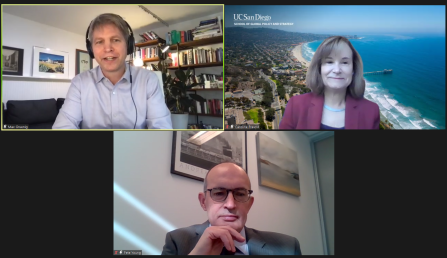
28 January 2022
On 27 January 2022 TCB partner E3G and the Konrad-Adenauer-Stiftung (KAS) USA hosted the event “Forum on Climate, Trade and Development: Pathways towards Transatlantic Cooperation and Policy Frameworks.” Paul Linnarz, Director of KAS’s USA Office, and Claire Healy, Director of E3G’s Washington DC Office, delivered opening remarks, followed by a panel discussion with Caroline Freund, Dean of the UC San Diego School of Global Policy and Strategy, and Peter Young, Minister-Counsellor and Deputy Head of the Trade Section at the EU Delegation to the US, moderated by Max Gruenig, Senior Policy Advisor at E3G.
The event unpacked a recent report by E3G and KAS that explores the interconnectivity of climate, trade and development and how transatlantic cooperation can provide solutions to the problems posed by the nexus of these three distinct policy areas. In her opening remarks, Healy emphasized if the EU and the US – that together account for around a third of global GDP and imports and exports – find a collective approach to balancing the imperatives of climate change, trade and development, they could create new rules and norms that the rest of the world follows. Should the EU and US come to a joint agreement on these areas, Freund argued that inequality and payments to developing countries need to form a significant part of the conversation. Though better for the world overall, the green transition will disadvantage certain groups in society and create the potential for entire countries to get left behind. Policy solutions like an international climate club, though an avenue worth pursuing, run the risk of focusing too heavily on like-minded countries and leaving the rest of the world out. “Walling ourselves off is not going to help the problem,” stated Freund.
Freund further argued that keeping politics front and center is critical when considering policy recommendations to align the trade, climate and development worlds. Instruments like the EU’s carbon border adjustment mechanism (CBAM), she stated, must be understood as politically necessary for countries to first be able to pass carbon pricing or similarly ambitious legislation domestically. Leaving out this practical element runs the risk of leading to unrealistic solutions.
Critically for transatlantic cooperation, Young expressed that the EU is eager to cooperate with countries taking different approaches to solving the climate crisis. The new EU-US deal on steel and aluminum will serve as a test case, argued Young, to see whether each power’s decarbonization instruments lead to the same place. If they do, Young suggested the EU will have to explore how to recognize these different policies.
Aligning the imperatives of trade, climate and development will be critical to solving the climate crisis and making sure a decarbonized global economy is an equal one. The panelists agreed that trade is a solution to development and climate problems, and the EU and US can place the world on fast track to finding these solutions by working together.
